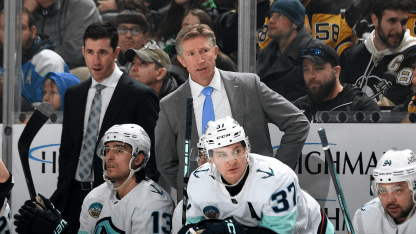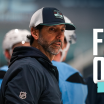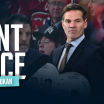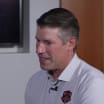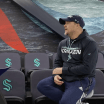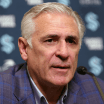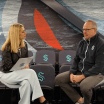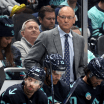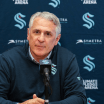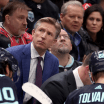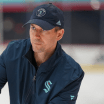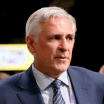This conversation occurred on Feb. 11, following the Feb. 10 game at Philadelphia
So, Dave, how was your break (over All-Star weekend and the bye week)? Were you able to get some R&R?
It was a great break. Lots of good family time and a little bit of time to relax; a lot of time to reflect and get ready for the stretch run.
That’s what we were curious about, do you take some of the downtime to assess your group? What do you have confidence or optimism about and what are areas that you really want to focus on down the stretch?
Everybody from our staff had different areas of our team that we wanted to look at. So, everybody took their own time away to do that and then bring all the information back together.
We're coming out of a stretch where we had a lot of different looks in our lineup with injuries. illness, and different things. Coming off of that, and over the break, we're coming into now a stretch where, at least for the time being, we have a pretty healthy group. So, one of our biggest areas of focus was how we wanted to set our groups (lines and pairs)...especially up front, which there's been a lot of movement in over the last stretch. That was the biggest area that we wanted to spend our time on and find that cohesion and some of that chemistry as we move forward.
About dealing with injuries, obviously, it’s a next man up mentality, but what are the challenges? How do you and your staff adapt to when you know a player is no longer available?
Number one, you evaluate how long that time period (that a player will be unable to play) is going to be because that determines who's going to need to fill that role and how much of a change that's going to be for them short-term or long-term and the challenge that comes with that.
But, on the flip side, at times when you do have players stepping into greater roles, sometimes, you get their very best as well, because they do have that opportunity and sense that opportunity. So now that we're coming back, into (being) a healthy group, we have to get guys into their into their roles, to the spots that they should be in (in the lineup), and we need them to be hungry and efficient in those roles.
Sometimes part of dealing with injuries is calling up a player from the AHL. From a coaching perspective, what is your process for bringing up perhaps a younger player? And then also how do you handle when you have to tell them they're headed back to the AHL?
In most of our situations, we've had more veteran players coming up, guys that have been in the league (and) that understand the role that they're in as a player within the organization -- that they may move up and down between the American League and the National Hockey League. (They are) good pros with experience behind them.
With a younger player, it's important to spend a little bit more time to make sure that the player coming up is (first of all) comfortable walking in the room and understands the role that he's stepping into, and is comfortable with the basic systems that we're playing. He is already familiar with (those systems), but stepping into this league is a little bit different than the league that he's coming from.
So, clarity of role and clarity of opportunity is important. Especially for a young player. And always, when the opportunity comes to an end and we're sending that player back down, it doesn't have to be a long conversation, but (we have) a very short conversation with some clarity to it on how his time here was and some of the positives; the reasons for him going back; the reasons, more importantly, why we see him coming back here; and what he needs to do to make that happen.
Speaking of communication, one of the things your players have complimented you on is an open-door policy fostering dialogue. You mentioned players coming back (from being out of the lineup) and then re-establishing their roles. Can you describe your communication philosophy with your veteran players?
Well, the season moves quickly. So, every time you think you have a little bit of time on your hands and an opportunity for things to slow down and maybe for more of that communication to happen, it's just not the case. So, I mean communication is time-sensitive. It's, number one, in the moment or close to the moment when things are happening; and then usually it has to be a very direct form of communication. There's just not a lot of time for long conversations either with the entire group as a team; with small groups within the team; or with individuals. So, that's the best way I think I can describe it is it's very time-sensitive, and it really has to be to the point.
Do you rely on your leadership group to help support that communication or does their communication (to the team) come from them internally as a group?
Oh, I believe that it's both, and whether it's with a small group or with individuals, I'll touch base or check in with guys on a lot of different things. I want guys to have a voice in what our days look like; in how we're doing things; and I trust that feedback. Especially as you're around and with players on a longer-term basis, you learn and understand when they can be effective in their feedback and in their thoughtful process. So, from my standpoint, any communication and feedback and give and take that I can have, not with just veteran players but with players in general, is what's going to help us in what we're doing.
What can you share about the communication you have with your staff, what goes on in your meetings, how you prep for practices, and the process underlying how you game plan?
I'm sure everybody will say this: it's a really hard-working staff. And we have guys that are very, very detailed on what they do, and how they evaluate the game and how they want to teach the game and how they want to coach the game. We know each other's strengths; we know how each other goes about their business; we know each other's personalities. We even know, probably how to push each other's buttons a little bit (said with a smile).
So, you get a little bit of everything behind closed doors. You can get some pretty well thought out, calm communication; you can get some heated discussions; and it's all got to, again, happen quickly. So even though you think you have a long day, a good, nice workday in front of you, you still have to be ready to address the players and have a really clear, crisp plan by 10:30 in the morning when you meet them for the first time before practice or earlier on game days.
You talked yesterday about how right now, the mindset must be one game at a time and playing for two points every game. You’re obviously focused on the next game, but are there overarching views that you have on how you’re approaching the balance of this season?
Every season is a little bit different in the way that it unfolds. You know, our season so far has really been a tale of two segments. The first 27 games we put ourselves in a tough spot. We found ourselves in a pretty deep hole looking up. Then the next segment of games before the All-Star break was a push by our guys. The guys dug in and found traction. We did the work to put us back into a position now where as we come back for this stretch run, we're in a position to fight for a playoff spot, and legitimately so. That now is really going to be the third segment of our season. And as I say, not many seasons are identical. This season seems to be shaping up in that way where we're entering the third and final portion of our year and it's a stretch drive right down to the end for a playoff spot.
This might correlate to those first two segments you described, but you have talked about how the team had to shift to a more defensive mindset. How did the group tell you that or what did you see that allowed you to make those adjustments?
Well, we as a group weren't scoring at a high rate. And when you're in a lot of close one-goal games in a tough schedule - which we had a very challenging schedule if you look at it in terms of strength of schedule - when you come through stretches like that, you have to find ways to tip the balance of the scales. And our focus was not just to tighten up defensively, it was (that) tightening up defensively was the one thing that we could control immediately with our effort, with our intensity, with our focus on detail. That needed to happen while we worked on the other side of our game in terms of generating more offense.
And we've had stretches where we've been able to look more dangerous offensively more often, but we still have not consistently reached that level. So, the defensive side of our game is going to have to remain and that was on display again last night (vs Philadelphia) offensively. Especially coming off of the break. Our execution wasn't great. In fact, in a lot of areas, our crispness and sharpness without the puck was not very good. The defensive side of the game should have been able to push us over the edge.
You talked about how some of the younger players might come up and show you their very best. This is a long season. You're of course focused on winning but are you able to enjoy moments like when Ryker (Evans) comes up and shows he can play or when Joey (Daccord) is fulfilling his new role when (Philipp) Grubauer goes down? Are you able to celebrate those moments even in the midst of a long season?
You're always excited for guys, and there's so many different things mixed in: we're celebrating guys that are playing their 500th game, there's 600th, 700th, 800th along the way. You're also seeing the young guys come up. We had "Wrighter" (Shane Wright) and "Wints" (Ryan Winterton) come up from the AHL early in the year and help us win a game in Colorado. Those (moments) should be celebrated, and those should be remembered. Those are big moments for those players, especially in their careers and those are big moments for your family.
So, 100 percent, if there's one thing that I've learned it's that you have to celebrate and you have to enjoy the small moments of success. Or else you just, you bypass them and you're just on to the next thing and I just don't think that's a great way to live life. You should enjoy the little moments along the way, the small successes along the way, and the people who are a part of them should be celebrated.
Anything I haven’t asked you about that you think is important to share about the current landscape you see in front of you with this team right now?
No, I think it's crystal clear. Our landscape is crystal clear. And the challenge and the opportunity...They're pretty much equal, and it's all in front of us.
This transcript was lightly edited for brevity and clarity
READ | Part 1: A Q&A with Ron Francis
READ | Part 2: A Q&A with Scouting Directors

